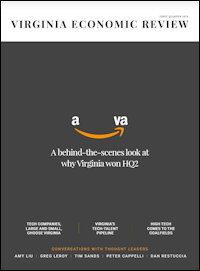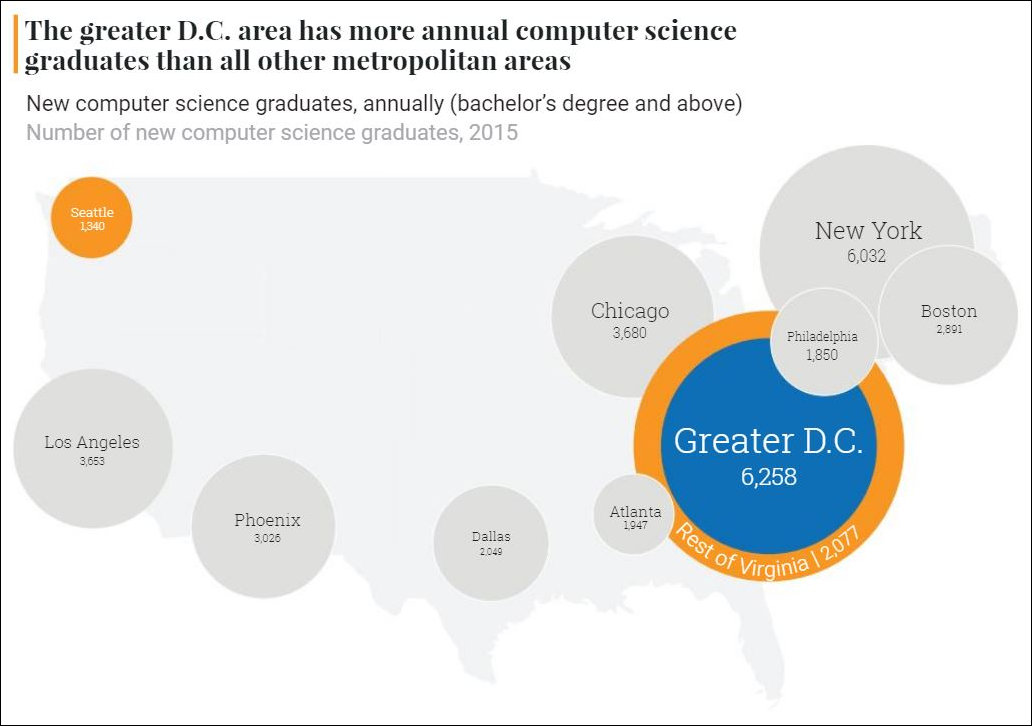Stephen Moret, CEO of the Virginia Economic Development Partnership (VEDP), is doing more than closing billion-dollar deals and resurrecting Virginia’s reputation as a top state to do business. He’s trying to change how Virginians think about economic development — or at least change what outsiders think about how Virginians think about economic development.
The VEDP has done something it has never done in the dozens of years that I have followed the partnership — launched a quarterly publication, the Virginia Economic Review, that will, in Moret’s words, “provide an inside look at Virginia’s economy, its diverse array of world-class companies, its amazing talent, and its stunning natural beauty, as well as insights from national thought leaders.”
With apologies to Oldsmobile, this is not your father’s sales material. With a focus on tech companies and tech talent, the inaugural edition interviews Amy Liu, a nationally known thinker about economic development with the Brookings Institution (cited previously on this blog); Peter Cappelli, director of the human resources center at the Wharton School; and Dan Restuccia, chief product and analytics officer of Burning Glass Technologies, a labor market analytics firm, among others.
Some of the insights contained within:
Amy Liu (Brookings):
We have to re-educate everyone about what success looks like in the modern era when there’s disruption in the retail sector, rise of automation, and a leaner manufacturing sector that is producing fewer jobs than it once did.
Today’s economy is service-oriented and knowledge-based. It is going to run on the ideas, entrepreneurialism, and skills of people. So future growth and wealth creation will come from investments in workers, including workers from different racial and ethnic backgrounds. Economic developers are realizing the critical nature of talent development in economic growth. …
I think the technology is occurring faster than the educational systems are adapting to it. We need to accelerate that. That’s why you’re starting to see coding schools and other nontraditional institutions emerging into the training marketplace.
We need to focus on a mid-tech workforce. In a review of 90 percent of all U.S. occupations, we have found that more than three-quarters of them have rapidly digitalized, including traditional pathway jobs. Many of these jobs do not require a worker to have a four-year college degree. I would love to see more K-12 and two-year institutions do more to prepare our young workforce for future jobs with basic computer literacy, software programming, and other data analytics. …
I definitely applaud Virginia for putting together a response to the [Amazon] HQ2 opportunity in a way that is not just about subsidies, and, in fact, the subsidies were not the kind of rip-off that most people were worried about. … The other thing I thought was very smart about the Virginia application was the focus on the talent pipeline. Unlike many other applications, Virginia did not offer an Amazon-specific solution and instead chose to invest in engineering and broader skills development through its higher education and K-12 institutions.
Peter Capelli (Wharton): Silicon Valley is known as a place where it is difficult to run a business, there are a lot of regulations, it’s really expensive, and commuting is a pain. Why, then, is everybody here?
Well, everybody’s here because the employees are here that we want to hire, and the employees are here because everybody else is here, right? The reason for those agglomerations, of course, is because employers want to hire on a just-in-time basis. The reason they’re there is they want experienced hires, and where do you find experienced hires who are in your niche industry and have had 10 years experience with these particular types of problems? The only place you find that is with density.
Dan Restuccia
(Burning Glass) on the technology skills gap:
Employers can increase demand quite quickly. The ability of job seekers to respond in real time is not there in the same way. On one hand, you can’t have a supply-side system that responds immediately for high-growth skills because those skills take time to learn. On the other hand, we right now have very poor and very weak signaling to students and job seekers around what it is that employers are looking for and how can you as a job seeker make sure that you have the skills that employers are looking for today and will be looking for one-to-five years down the road. …
The question for Amazon was not a cost-driven one. Their optimization was not, “Where can I get the most workers most affordably?” Their question was, “Where can I get the tens of thousands of tech workers that I need?” I think they were driven to New York and the Washington region because those are the cities that have large tech workforces from which to draw. They have robust pipelines of new tech workers coming in, both through local universities and also as cities that are relatively easy to attract people to move to.
Speaking of the skills pipeline, the Virginia Economic Review displays this graphic based on National Center for Education Statistics data:
There are other articles in the inaugural edition worth highlighting, which I will do in due course. This content deserves to be circulated widely within Virginia as well as without.



Leave a Reply
You must be logged in to post a comment.